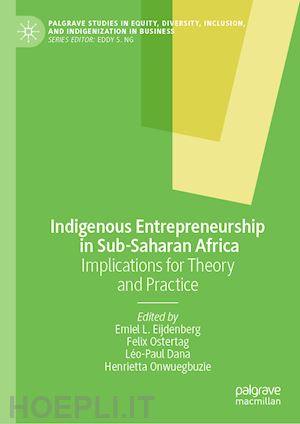

Questo prodotto usufruisce delle SPEDIZIONI GRATIS
selezionando l'opzione Corriere Veloce in fase di ordine.
Pagabile anche con Carta della cultura giovani e del merito, 18App Bonus Cultura e Carta del Docente
This book presents a comprehensive overview of contemporary indigenization topics in the cultural context of sub-Saharan Africa. Discussing current state of affairs of indigenous entrepreneurship in Africa, it seeks to understand what enables and constrains indigenous entrepreneurship in the region. Further, it explores the role of the institutional environment in promoting indigenous entrepreneurship.
Tying in the UN Sustainable Development Goals, the chapters examine how indigenous entrepreneurship relates to ending poverty, creating decent work and economic growth, reducing inequalities, contributing to sustainable cities and communities, and promoting peace, justice and strong institutions.
For researchers interested in how indigenous entrepreneurship practices in sub- Saharan Africa contest contemporary theories in entrepreneurship and management research, this work will prove a valuable resource with its much- needed case studies, quantitative and qualitative research, and practitioner perspectives.
Part 1: The heart of the matter: Identity, motivation and inclusiveness.- Chapter 1: Indigenous entrepreneurship and identity An exploratory study of entrepreneurs in the Namibian sandbox.- Chapter 2: Entrepreneurial motivation among small-scale business entrepreneurs A case study of Tanzania.- Chapter 3: Indigenous social entrepreneurship and social capital: Inclusion tools for people with disabilities in Ghana.- Part 2: Indigenous entrepreneurs and their unique environments Challenges and opportunities.- Chapter 4: The nexus between a generic enterprise broad-based black economic empowerment strategy and employee satisfaction.- Chapter 5: Entrepreneurial fishmongers in Kenya.- Chapter 6: Mind your business or mining business? Indigenous entrepreneurship in the Copperblt Province of Zambia.- Chapter 7: Indigenous entrepreneurship as a pathway for Nollywood’s global relevance and SDG 8 intervention.- Chapter 8: Indigenous handcraft entrepreneurship in Ethiopia Practices, challenges and opportunities.- Chapter 9: A focus on cannabis as an indigenous entrepreneurial activity in South Africa by the indigenous Khoisan and Bantu.- Part 3: Creating meaningful impact: Strategic sustainability, innovation and digitalization.- Chapter 10: Investigating triple-bottom line in the context of indigenous entrepreneurship: A systematic review.- Chapter 11: Ubuntu facilitates open innovation for entrepreneurs Synergising through an African perspective.- Chapter 12: Digital financial inclusion: The perspective of digital financial services adoption among indigenous entrepreneurs in Uganda.- Chapter 13: Frugal innovations and their societal benefits: Perspectives from Ugandan indigenous entrepreneurs.- Chapter 14: Business expansion strategies on indigenous innovation commercialisation of small indigene firms An emerging economy perspective.- Chapter 15: Delivering meaningful poverty alleviation experiences The role of successful Ghanaian Indigenous women entrepreneurs.
Emiel L. Eijdenberg is an Associate Professor at HU University of Applied Sciences Utrecht, the Netherlands. Previously, he worked in multiple academic and management roles at universities in Germany and Singapore. His research interests are about entrepreneurship and tourism in emerging markets.
Felix Ostertag is Sustainability Officer / Senior Manager ESG at Süddeutsche Krankenversicherung a.G., Germany, and worked previously as Associate Professor at EM Strasbourg Business School, France.
Léo-Paul Dana is a Full Professor at Dalhousie University, Canada and associated with Sorbonne Business School, France. He served as Expert Witness for the Government of Canada House of Commons Standing Committee on Transport and later as Senior Advisor to the World Association for Small and Medium Enterprises with United Nations advisory status.
Henrietta Onwuegbuzie is an Associate Professor of Entrepreneurship and Management, and the Director of the Business Innovation Accelerator at Lagos Business School, Pan-Atlantic University in Nigeria.











Il sito utilizza cookie ed altri strumenti di tracciamento che raccolgono informazioni dal dispositivo dell’utente. Oltre ai cookie tecnici ed analitici aggregati, strettamente necessari per il funzionamento di questo sito web, previo consenso dell’utente possono essere installati cookie di profilazione e marketing e cookie dei social media. Cliccando su “Accetto tutti i cookie” saranno attivate tutte le categorie di cookie. Per accettare solo deterninate categorie di cookie, cliccare invece su “Impostazioni cookie”. Chiudendo il banner o continuando a navigare saranno installati solo cookie tecnici. Per maggiori dettagli, consultare la Cookie Policy.